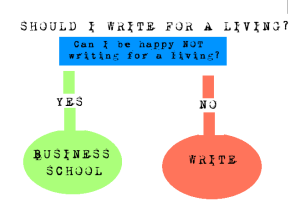 This last weekend, I was privileged to meet hundreds of writers, aspiring writers, publishers, business writing coaches like me, agents and editors at the 44th annual Willamette Writers Conference. My talk on building writing platforms got a lot of compliments, and nobody threw anything at me other than questions. As always, my takeaway was twofold:
This last weekend, I was privileged to meet hundreds of writers, aspiring writers, publishers, business writing coaches like me, agents and editors at the 44th annual Willamette Writers Conference. My talk on building writing platforms got a lot of compliments, and nobody threw anything at me other than questions. As always, my takeaway was twofold:
1. Writers are really cool to hang out with.
2. Few writers have a business approach to their writing.
It’s point two that I try to fix as a business writing coach, and here in this blog. Today, let’s start at the beginning…since I’m sure a lot of folks who I just met this weekend will want to start there. Like Stephen Covey tells us in his classic The 7 Habits of Highly Effective People, we begin with the end in mind. That means you start envisioning your writing business by deciding why it it you want to write. Here are a handful of reasons I heard at the con:
- “I want to see my work in print”
- “I want a deal with a big six publisher”
- “I want to quit my day job”
- “I want my brother to be jealous”
- “I don’t want to spend so much time not writing.”
- “I love to write.”
- “I love the flexibility of writing for a living.”
These are all great reasons to write. Not all of them are great reasons to write professionally. If you simply love to write and enjoy your job there’s little value in sacrificing that security just to write more. There’s even risk of losing some of your love for writing if you have to do it every day instead of get to do it when you want. Different reasons also help you make the right decision about how to act in your writing career. If you want to see your work in print, taking advantage of the self-publishing and e-publishing platforms is a completely valid approach. If your goal is to make your brother jealous via a deal with a big six publisher, not so much.  Take some time to really think about why you write now, why you want to write for a living, and what you hope to get out of a freelance writing career. All of your decisions about how and what to write should stem from those reasons. Encapsulate them in a mission statement that you can review whenever your motivation starts to flag. So, friends and readers, why do you write? Will any of that change if you go full-time? Have your reasons changed over the course of your writing career so far?
Take some time to really think about why you write now, why you want to write for a living, and what you hope to get out of a freelance writing career. All of your decisions about how and what to write should stem from those reasons. Encapsulate them in a mission statement that you can review whenever your motivation starts to flag. So, friends and readers, why do you write? Will any of that change if you go full-time? Have your reasons changed over the course of your writing career so far?

I attended your presentation at the Willamette WC this year and must say it was by far my favorite workshop. I feel like I came away with a ton of inspiration and useable information. Thank you!
Kelley….awwww, blush. I just hope it was helpful. Do you have any questions from the presentation I could answer here in the blog, or via email with you?